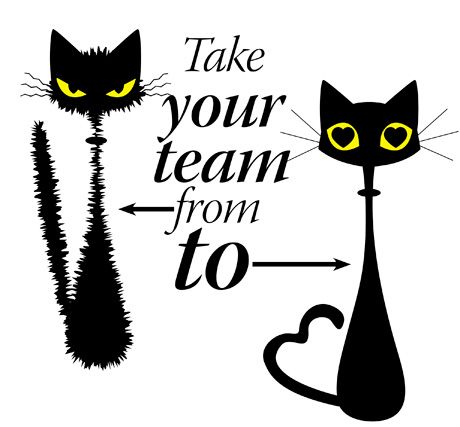Take your veterinary team from frazzled to fantastic
Use these checklists and advice to learn what motivates your teamand what gets their back up. Hint: You can copy these lists and leave them on your bosss desk.
It's hard work to build a strong team that supports your hospital's image and vision. Team members who lack enthusiasm and possess a negative attitude can drag down the entire team and prove toxic to the practice. And you may be surprised how you're unwittingly hindering your team and breeding negativity. No doubt it's a challenge to turn around these bad attitudes. Recognizing positive steps and trying to learn more about your team's goals and purpose can help improve the vibe of your workplace. On the following pages, you'll find lists of dos and don'ts to boost morale.

Use this checklist of dos to boost morale

Do create the attitude yourself. Step one to motivate your team is exhibiting the behavior you want to see. When you come into the workplace rejuvenated and ready to go above and beyond, the attitude will rub off on your coworkers. Show your team that your job is more than just a paycheck. Your success will breed more success throughout the practice.
Do develop an employee recognition program. Most team members will thrive off of positive recognition-whether it's a gift card or extra day off. Simple rewards help motivate everyone to work towards side goals and improve morale. Getting a pat on the back from a supervisor or teammate reminds us that we are appreciated and our work makes a difference. Try a compliment or “shout out” board for the team to use. Encourage nominations with a submissions box so a supervisor can review and post them. It never hurts to add in a reward, however small, to whomever gets the most compliments each month. Even small gestures such as a small coffee shop or music gift card can feel meaningful to team members.
Do be wise about how you recognize. Not all team members want to be brought front and center to have their accomplishments recognized publicly. While some may thrive off of the special attention, it can just feel awkward and uncomfortable to others. Know your team, and be understanding and cognizant of their preferences. Some team members will prefer to be pulled aside at a quiet moment to hear that you appreciate their work.
Do use the power of positive deviance. When you first meet resistance to your management plan, you may feel frustrated and even angry. Remember, if team members are still successfully completing the assigned tasks in a slightly different fashion from your preferences, choose your battles. Ask yourself whether it's worth letting go. Moreover, try to step back and understand the new approach and see if this deviance could help improve procedures. Give your team a bit of freedom to make the hospital their own and contribute ideas.
Do trust your team to delegate. Establishing trust in your team-and not taking on all tasks yourself-is also very important. If you think you can't delegate tasks out to your team, one of two things happening: either you don't have a strong enough team and need to retrain, or you're micromanaging. Take a deep breath, assign some of the tasks to your team and give them a chance. Try not to hover or constantly badger. If you find they aren't handling tasks appropriately after you give them time to learn these new duties, reassess and help your team improve with more training.
Do discover aspirations. Most employees, especially in this field, have some sort of passion or goal within the profession. Whether they're aspiring to a management role, to becoming a credentialed veterinary technician or perhaps learning more about client communication, try to recognize and tap into these desires to ignite their passion. Having personal goals helps increase team members' enthusiasm and provides something to work towards. It means a lot to the team when their supervisor acknowledges and supports these aspirations.
Use this list of don'ts to keep morale high

Don't tolerate procrastination. When you sense the presence of procrastination within the practice, squash it quickly. Help pinpoint the reason your team can't stick to deadlines-such as poor prioritization of daily tasks-and help coach team members struggling with time management. If the employee still doesn't take the duties seriously even with help, reassess his or her role in the practice. Remember, these toxic attitudes can spread rapidly throughout the team.
Don't micromanage. Micromanaging is the opposite of motivating your team. It can make your team members feel like you don't trust them. If this feeling is perpetuated by management, a self-fulfilling prophecy may take effect: The team may no longer try as hard. If they have no freedom and no chance of proving themselves, why expend energy on going above and beyond?
Don't punish small mistakes. Choose your battles. Mistakes are truly just that-mistakes. Don't harp on the small ones your team owns up to. The obvious exceptions: If a mistake compromises the patient's care or endangers the hospital's work flow or vision, plan a more serious coaching session. Most team members will know when they've goofed up, and they'll do their best to not repeat it on their own. If the errors reoccur often, positive, constructive coaching may help.
Don't be set on your way (and no other). It's not your way or the highway. It will help you grow as a manager to learn useful, varying approaches to your own way of doing things. Be open to suggestions from the team. And if the job gets done effectively, but they just took a different approach, embrace the ingenuity. It breeds mutual respect within your team and may boost efficiency.
Don't be overly critical. Almost everyone can offer assets to help your team. Focus on helping your team shine, rather than critiquing everything they do that you slightly disagree with. For example, say it's your pet peeve to see someone on their phone at work. But if they're only checking a text a couple times a day and are exceedingly productive the rest of the time, you may decide to just let it be. Each team member has different needs. And some people need a breather to be more productive, and that's OK. Whenever you feel the need to criticize, ask yourself: is this a repetitive behavior and is it compromising the hospital's productivity? If the answer is no, go to the break room or outside and take a breather yourself.
Try not to give up too easily on your team. And remember that management is a fine art that takes time and practice to perfect. The worst thing you can do is to place all of the blame on your team. Always analyze your current approach with each person and find ways to help them shine. Making team members who are enthusiastic and content a priority will help create a positive environment with significantly less turnover. In return, your time and effort will spell success for you, your practice and your team.
Oriana Scislowicz, BS, LVT, VDT, is a Firstline Editorial Advisory Board member and a technician in Richmond, Virginia.